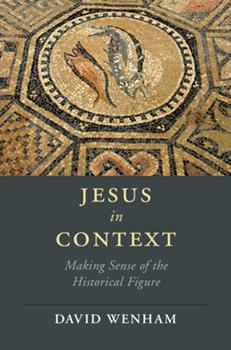Q. Let’s talk for a minute about the event at Caesarea Philippi. It has always seemed to me that the proper question to ask about why Jesus took them there to reveal his identity, has to do with the fact that various pagan gods had been worshipped there, and of course there is the new temple of Augustus. I agree with Tom Wright that Jesus took them there to say ‘I am the reality of which these pagan gods are the parody’. Otherwise, it is strange that he would take them to Gentile territory to reveal the truth about himself, and to emphasize his non-traditional view that as the Son of Man must suffer as a ransom for many. I have stressed that in the Markan outline the questions about who and what and why are raised about Jesus in Mark 1-8 and answered in that last chapter, as the necessary prequel to revealing to the disciples what his final mission was. In other words, you need to know who Jesus is before you can understand why he had to die (and it is surely no accident than 4 times in Mark 8-10 Jesus stresses his coming suffering etc. That makes Mark 11-16 being the record of mission accomplished. Does this make sense? Clearly Peter is not looking for a suffering messiah, but I don’t think anyone before Jesus interpreted Isaiah 53 that way. Say some more about your evaluation of Peter’s confession and its sequel.
A. The journey to Caesarea Philippi was a very long one, on foot. And I suspect that you and Tom are right in some of the geographical symbolism. What I suggested was that a major reason for the journey was that it reflected Jesus’ awareness of reaching a major turning point in his ministry. He had worked up to this point primarily in Jewish areas, calling the ‘lost sheep of the house of Israel’ to repent and to receive the kingdom of God; but he experienced very mixed responses: some seed fell into good ground, but a lot didn’t, and indeed he experienced serious opposition and rejection, even in his home territory of Galilee. This will have brought home to Jesus that the time had come for a change of direction, literally and spiritually, and he turned towards Jerusalem for what we could call a final showdown with the Jewish leaders and people. He knew this would surely lead to his death, which would itself be the fulfilment of his supreme calling to lay down his life as a redeeming sacrifice for the sins, not just of the Jews, but of the world – in fulfilment of Isaiah 53. I see Caesarea Philippi as rather like a retreat before an ordination in the modern church except much more so: Jesus spends time with his disciples and shares them with his vision and vocation, which is an almost impossible idea to digest for a group of men who hoped that Jesus would go to Jerusalem (yes!) but to be a conquering Messiah not a suffering servant.












